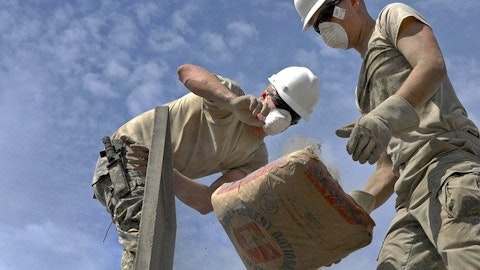So, if we’re, have an acquisition, the past year, we’ve been up around, 2.83 times, we’re going to look to make sure that we get the balance sheet back down to around two, free cash flow then gets steered toward shareholders. And usually we share repurchases we have the flexibility, if an M&A transaction that’s sizable comes around. So, yes, the answer to the question is we have sufficient capital and we see sufficient capital going forward for both a dividend increases for the share repurchase, the one-year share repurchases, and reserving capital to both put to debt reduction for on the balance sheet for a potential bolt on M&A. I think that’s the flexibility that we’re trying to describe with our stable sales with our expanding margins. It generates, it’s a company that generates we’ve historically generated 7% cash conversion to sales.
And that type of capital gives us a lot of options, gives us a lot of flexibility, keep the balance sheet in good shape and return to shareholders.
Alex Hantman: Thank you appreciate the color there. And speaking of capital allocation, given the size of opportunities you’ve laid out previously, and PFAS remediation, and we’ve talked about today, do you expect significant additional investments in business?
Doug Dietrich: Yes, organic investments. So, we’re continuing to invest? If I answer your question, if I understood it properly, we invest in R&D, we’ve got a sizable pipeline of new products. We’ve gone back to talk about how we’ve increased the revenue from new products that we’re making investments in. We used to be around 5% of sales, we’re now approaching 12%, 13%, 14% of sales will get you a number. This year, we’ve accelerated the new product development, we’ve cut the time in half to bring them to market and we’ve doubled the impact. $300 million of our sales are coming from new products each year. And that was much less than half about five years ago. So, we are investing in new technologies. We’re investing in new technologies that yield higher margin products.
We’re working very closely with customers to build what we call roadmaps. And so looking out four, five years with them and seeing what their needs are and building new products and technology roadmaps with our customers that guides what goes into our innovation. And then yes, we’re investing in our plants to make sure that we have sufficient capacity to make those products. So, but that all is coming through our normal capital expenditure program. That’s about 4% of our sales. And yet, we still have, as we — your previous question, have excess capital and free cash flow after that to be able to keep the balance sheet straight and, and return to shareholders. So yes, we are investing in many ways in ourselves. And we think we find that investing ourselves is one of the best investments to be honest with you.
Alex Hantman: Absolutely. And just one quick clarification on that. I had meant to focus a little bit more specifically on PFAS remediation and some of the additional investments you might have in that line of business?
Doug Dietrich: Yeah, so we have in part of that environmental infrastructure is a host of water remediation technologies. They are host of, of environmental type technologies. We laid this out, hopefully, you had a chance to look at our Investor Day, from groundwater remediation in slurry wall to sediment capping, to wastewater remediation, and even drinking water remediation. And so we have a number of new technologies. And we have plenty of capacity currently installed to be able to ramp up to satisfy areas like PFAS remediation. And we also have targets to be able to invest to make sure in new capacity make sure we cover that. So, like it’s a slow, it’s a slow ramp. But we’re keeping an eye on it. We understand the capacities of our plants, the capabilities and the technologies and certainly willing to invest when we see the inflection points for PFAS specifically, going forward.




